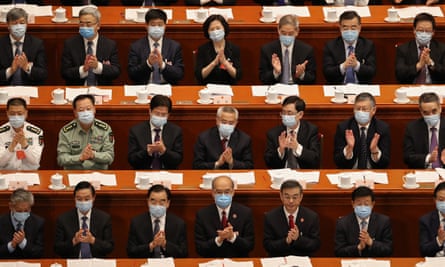Beijing Protecting Hong Kong From Terrorism
"Hong Kong has flourished as a bastion of freedom."
"[The security law would ] curtail the Hong Kong people's liberties, and in doing so, dramatically erode Hong Kong's autonomy and the system that made it so prosperous."
Joint statement, United Kingdom, United States, Australia, Canada
"This is the death knell for Hong Kong, make no mistake of it, this is the end of 'one country, two systems' ...the Hong Kong that we loved, a free Hong Kong'.
Dennis Kwok, pro-democracy lawmaker
 |
The National People's Congress, voting in the Great Hall of the People, just west of Beijing's Tiananmen Square, loudly approved and applauded the vote that took place on Thursday, a tally that indicated 2,878 votes supported moving forward with legislation, with one vote opposed and six abstentions. While the world has been distracted and busy attempting to ward off the worst advances of the SARS-CoV-2 virus, Beijing has immersed itself in finalizing the death knell of autonomous Hong Kong, cancelling the formula that recognized its unique status since 1997.
The imposition of a new security law on Hong Kong will now criminalize any such activities like protesting and criticizing Beijing. Either of which is analogous in Beijing's opinion to secession and the detested 'splittism'. As the Communist Party elite explain it to any who might not understand, the purpose of the legislation is to cope with secession, subversion, terrorism and foreign interference in Hong Kong. The plan had sufficed to instill fear into Hong-Kong's pro-democracy factions, triggering large protests.
And those protests brought out the riot police in huge numbers even while its own lawmakers engaged in debating an entirely other piece of legislation with a like purpose, to criminalize disrespect of China's national anthem. Police made 360 arrests while thousands of Hong Kongers marched in protest in the streets over the anthem bill and the national security legislation. It is abundantly clear that Beijing is imposing its authority, eroding the autonomy of Hong Kong in the process.
 |
| China’s National People’s Congress Photograph: Andrea Verdelli/Getty Images |
An assurance was issued by China's Premier Li Keqiang, that the "one country, two systems" formula is meant to remain a national policy, but the new law would provide for Hong Kong's long-term stability and prosperity. Enactment of the law is anticipated prior to September, as details are being drawn up in the coming weeks. But no threat exists to the city's autonomy, Chinese authorities claim, backed by the Hong Kong, Beijing-approved government.
According to Hong Kong's leader Carrie Lam, the legislative work would be completed as soon as possible as she works with Beijing: "The law will not affect the rights and freedoms enjoyed by Hong Kong residents". Somehow, the pro-democracy element finds her statement as reassuring as that emanating out of Beijing.
"We urge China to step back from the brink", stated British Foreign Secretary Dominic Raab.
Britain plans to change the status of British national overseas passport holders, should China not suspend the new law, enabling such BNO passport holders to come to the United Kingdom for periods in excess of six months, an effective pathway to eventual citizenship.
| Anti-government demonstrators in Hong Kong scuffle with riot police Wednesday during a protest as the second reading of a controversial national anthem law takes place. (Tyrone Siu/Reuters) |
Labels: Autonomy, Beijing, Chinese Control, Hong Kong, Protests

<< Home